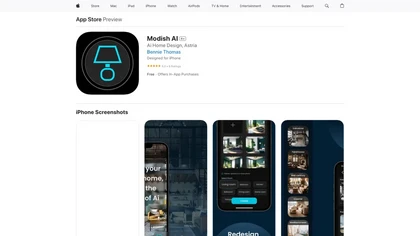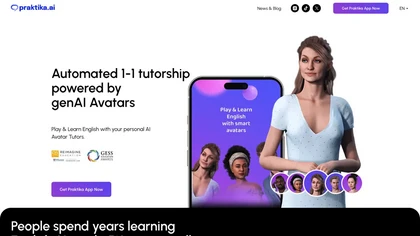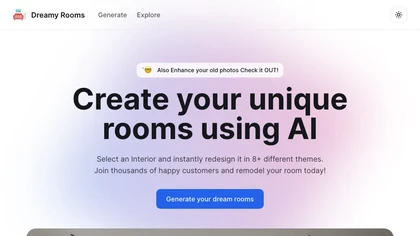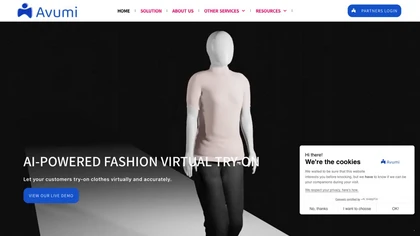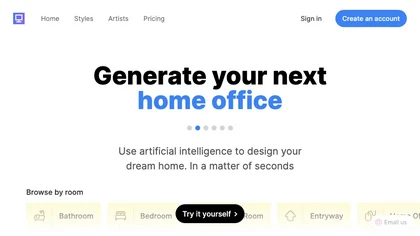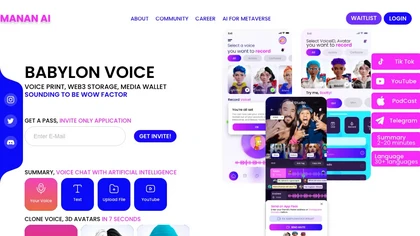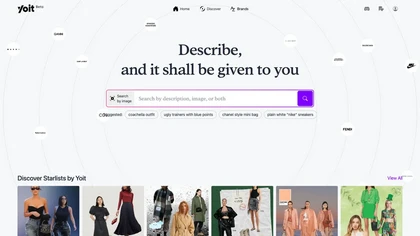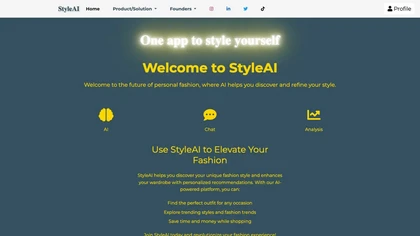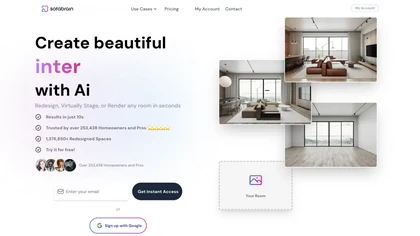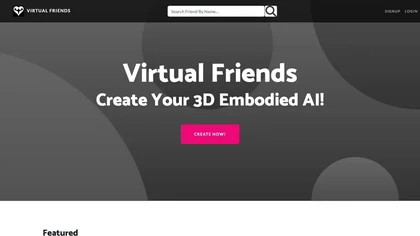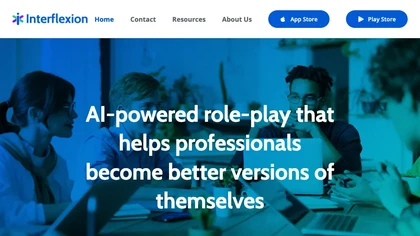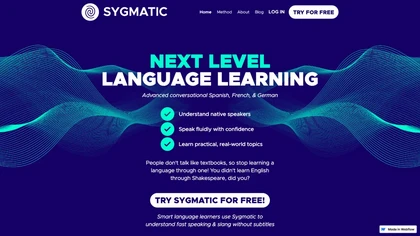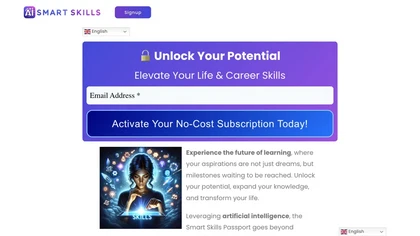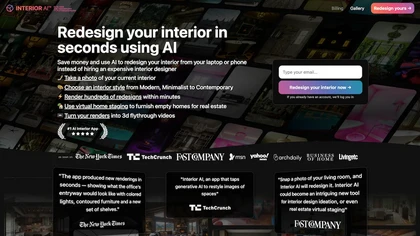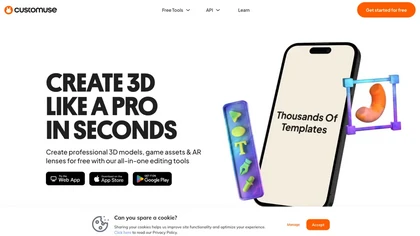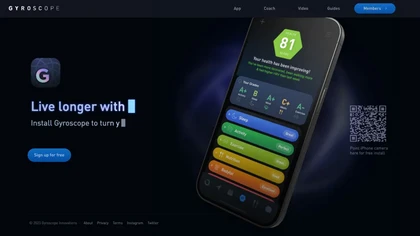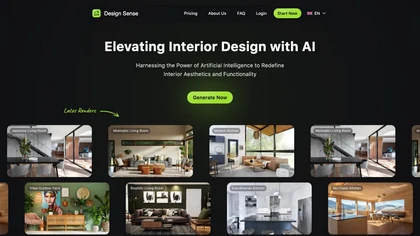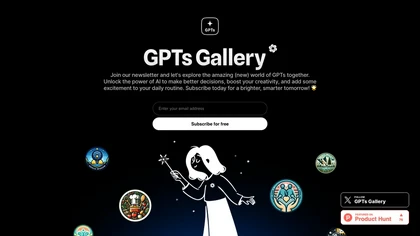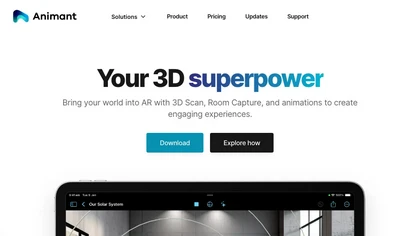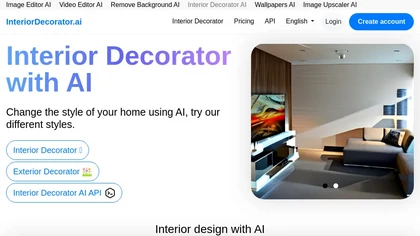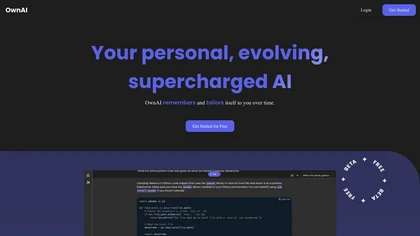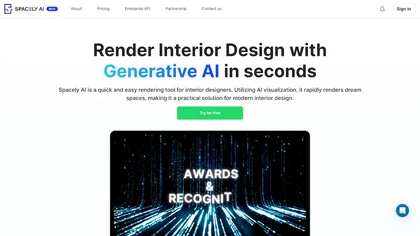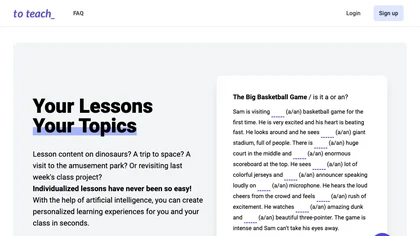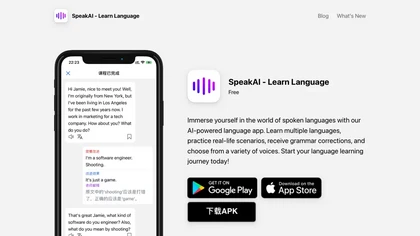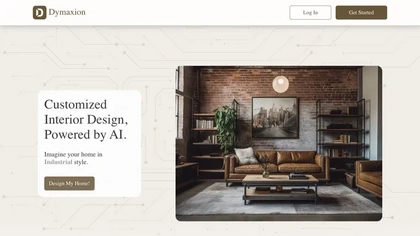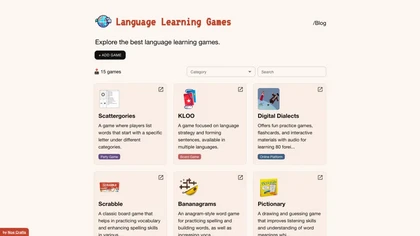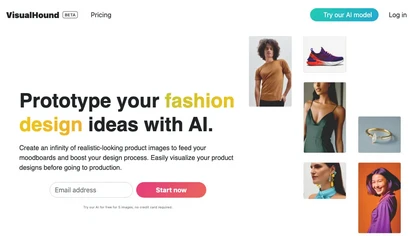AI use cases for Augmented reality
Generative AI can be applied in various applications for augmented reality. Here are some examples to explore below for inspiration with AI tools to get you started with using AI in augmented reality.
🛠️ 70 AI tools for Augmented reality
Explore a dynamic list of some of the most popular tools to get you started with various AI use cases and applications for Augmented reality to streamline your workflows and productivity today.
ClothingAI features
- Create unique clothing designs
- Experiment with color schemes
- Customize garments with various details
- Receive up to nine design renders
- Easily iterate on designs or share with others
FashionAI features
- Recommends unique fashion styles
- Get outfit ideas for various occasions
- Uses latest technology in artificial intelligence
- Provides personalized recommendations
- Assists in creating a stylish and comfortable summer wardrobe
DesignAi features
- Style preference understanding
- Room recreation
- Instant inspiration
- Clutter removal
- Dream room reimagination
LookBook features
- Sustainable outfits
- Tailored to individual tastes
- User-friendly interface
- Virtual models
- Step-by-step guidance
Modish features
- AI-powered home design experience
- Design Room feature for 3D room designs
- Extensive catalog of tens of thousands of decor items
- Photo-realistic imagery and augmented reality technology
- Cross-platform compatibility and offline design capabilities
Play2Learn features
- Transforms training and lifelong learning through gamification
- Provides dynamic and immersive scenarios for users
- Offers interactive learning experience tailored to individual goals
- Utilizes AI tools for customization of scenarios and tests
- Allows tracking of progress, identifying knowledge gaps, and enjoying diverse gaming scenarios
immerse.com features
- Unlimited live classes
- AI-powered conversation practice
- Interactive events to connect with a global community
- AI roleplays for building confidence
- Progress tracking and task management dashboard
🔥
Create your account, save tools & get personal recommendations
Receive a weekly digest of our handpicked top tools.
Unsubscribe anytime
Dreamlife features
- Design idea generation
- Home shopping
- Renovation task streamlining
- Professional networking
Immerse features
- Virtual reality language classes
- Authentic virtual environments for conversation practice
- Small group lessons and daily events
- AI roleplays for language skill enhancement
- Progress tracking through a dashboard
Augment AI features
- Keep track of scattered digital life
- Learns and accesses data from various apps
- Automatically saves and summarizes important information
- Creates personalized content
- Anticipates and completes sentences
Outfits AI features
- Generate outfits
- Recommend outfits
- Create outfit plans
- Suggest accessories
- Provide style advice
Talkface features
- 1-on-1 tutoring
- Personalized curriculum
- Language learning
- Fun and engaging
- Affordable solutions
- Eliminates need for unreliable tutors
- Available on android and ios devices
Interior AI - Design any space features
- Generates personalized design concepts
- Offers a wide range of design styles to explore
- Generates endless design ideas for every room
Summer AI features
- Ai gps technology
- Personalized experience
- Walking and driving navigation
- Augmented reality discoveries
- Visually enhanced journey
Praktika.ai features
- Generative AI avatar tutors
- Personalized 1-1 tutorship
- Real-time session feedback
- 1000+ lessons
- Unlimited learning opportunities
HomeDesignsAI features
- Get new interior redesign ideas
- Get new exterior redesign ideas
- Get new garden redesign ideas
- Use 40+ different design styles
Coated features
- Photo upload
- Style selection
- Furniture recommendation
- Decor recommendation
- Predefined style selection
newroom.io features
- Combines ChatGPT and Google Drive capabilities
- Virtual staging with automatic furniture addition
- Search for furniture products from top retailers
- Sketch rendering and 3D model rendering in the pro plan
- Upcoming features like upscaling images and interior video showcases
DreamyRooms features
- Generating unique room designs
- Enhancing old photos using ai technology
- Offering a wide range of design themes
- Transforming selected interiors into chosen theme
- Analyzing interiors and transforming them into desired theme
Avumi features
- 3D virtual try-on experience
- Accurate virtual clothes try-on
- Outfit visualization
- Online shopping enhancement
- Live demo viewing
Interior Computer features
- Room styles browsing
- Design exploration
- Visualization
- Account creation
- Future reference
- Outdoor space design
Babylon Voice features
- Voice chat
- Messaging services
- Unique voice print
- Web3 storage system
- Clone voice
- Create 3d avatars
- Access through various channels
RoomAI features
- Generate thousands of unique and innovative design proposals with a single click
- Tailored design proposals based on room's structure and layout
- Access to a one-stop design solution for various room types
- Diverse selection of design styles available
- Recommendation of five color schemes by renowned designers for each design style
Yoit features
- Fashion discovery platform
- AI technology for unique search experience
- Search using words or images
- Personalized search results from vast collection
- Curated items from 1,400+ retailers worldwide
StyleAI features
- Personalized outfit recommendations
- Virtual wardrobe upload
- Clothing combination visualization
- Efficient clothing item location
- Deals and discounts on fashion pieces
SofaBrain features
- Virtual room staging and rendering
- Wide range of interior design styles
- Furniture swapping and customization
- Instant smart room advice
- Visualizing simple changes in rooms
Virtual Friends features
- 3D embodied AI assistant
- Design and interact with personalized AI characters
- Shape virtual friends' personalities and interactions
- Dynamic and immersive interactions
- Platform for exploring AI companionship
Interflexion features
- Career coaching
- Personalized development plan
- Skill assessments
- Goal setting
- Progress tracking
Sygmatic features
- Focused on conversational language learning
- Emphasizes practical, real-world topics and natural speech patterns
- Visualizes communication highlighting nuances like slang, humor, and emotion
- Offers video lessons on various topics created by native speakers
- Provides features like pronunciation visualization and context-based learning
SmartLifeSkills
4.8SmartLifeSkills features
- Interactive platform with AI chatbots
- Multilingual lessons with authentic accents
- Adjustable playback speed
- Advanced text-to-speech technology
- Custom quiz generator
Language Atlas features
- adaptive lessons
- flashcard usage
- speaking practice
- audio and video examples
- global community
Aesthetic Room AI features
- Virtual interior designer functionality
- Photo upload for room redesign
- Wide range of styles and combinations
- Creation of unique and personalized spaces
- Utilized by real estate agents for interior visualization
InteriorAI features
- Train ai models
- Choose from various design styles
- Virtual stage mode
- Interior design mode
- Download and mix different renders
Glosa features
- Personalized learning experience
- Adapts to user style, pace, and preferences
- Mobile-optimized platform
- Track progress visually
- Extensive selection of languages
FicitonGenie features
- Personalized feedback based on reading and creativity skills
- Multi-lingual book adventure feature for exploring different languages and cultures
- Tailored AI profiles based on child's age and language preferences
- Narration options in preferred language for promoting learning and vocabulary expansion
- AI-powered feedback system for tracking and enhancing creativity and storytelling passion
Workout Tools features
- Personalized workout sessions
- Tailored workout plans
- Adapts to available equipment
- Extensive database of exercises
- Customized training experience
AI Mirror features
- Innovative AI development tool
- Focused on creating unparalleled app experiences
- Utilizes cutting-edge AI technologies
- Develops AI-powered apps and games
- Offers a wide range of AI-powered solutions
Customuse features
- Create professional 3D models
- Design for various platforms like Roblox, Snapchat, Minecraft, TikTok, Zepeto, and Instagram
- Brand kit for storing fonts, colors, and logos
- Collaboration with a community of over 1 million creators
- Access to templates for design transformation
Aesthetic intelligence features
- Personalized digital style twins creation
- Visual quiz for aesthetic personality traits
- AI-powered product curation feature
- User privacy prioritization
- Innovative digital style twin technology
Gyroscope features
- Personalized guidance
- Video guides
- Tracking tools
- Insights through reports
- Custom workouts
RoomGPT
3.6RoomGPT features
- Virtual room remodeling
- Generating different themes for a room based on a picture
- Eliminating the need for interior design
- Positive feedback from tech experts and startup founders
- Helping users get indecisive about their home decor decisions
Design Sense features
- Generation of various design styles
- Upload images of existing rooms for restyling
- Exploration and visualization of redesigned spaces through photos and videos
- Access to different render styles
- Offering a Pro account for additional features
GPTs Gallery features
- Access to specialized GPT modules
- Culinary Companion for cooking inspiration
- Weekly Wisdom for daily motivation
- Parenting Ally for valuable parenting tips
- Codemaster for learning coding effortlessly
Rooms features
- Create rooms
- Remix rooms
- Add items
- Customize rooms
- View source code
- Share room links
- Playback on desktop and ios devices
Paintit.ai features
- AI-driven interior design generator
- Refill the space
- Furniture recognitions
- Commercial use license
- Download designs
Animant features
- 3d scene creation
- 3d object generation
- Ar scene interactivity
- Room capture
- Product demo creation
LalaLand.ai features
- Avatar creation
- Customization
- Pose and emotion selection
- Clothing addition
- 3d model validation
REimagine Home features
- Generate personalized design concepts
- Virtual staging
- Redesign spaces
- Inspire designs
Interior Decorator AI features
- Image editing
- Generate interior design ideas
- Generate exterior design ideas
- Integrate with own projects
AI Design Training features
- Virtual staging
- Upcale images
- Convert sketches to realistic renderings
- Expert prompts
- Incorporating AI workflows
Insightful features
- Provide personalized on-demand coaching
- Focus on specific needs
- Available anytime, anywhere
- Blog with latest insights on living a fulfilling life
- Accountability coaching to help young professionals reach full potential
BodyGuru features
- Personalized wellness routines generation
- Tailored recommendations
- Free platform
- Upcoming features integration
- Developed by JBBAE
THERAi features
- Memory system for learning from past interactions
- Free image generation feature using state-of-the-art technology
- Supercharged tools for web search
- Adaptive multi-modal communication (text, voice, interactive)
- Data security and privacy prioritization
Spacely features
- Suggest furniture options
- Create dream space
- Generate unlimited designs
To Teach features
- Create personalized exercises
- Create lesson plans
- Tailor teaching materials to students' interests
- Offer free and paid plans
- Work alongside human teachers
SpeakAI.cc features
- AI-powered language learning app
- Personalized learning paths and interactive exercises
- Support for a wide range of languages
- Real-time feedback and personalized grammar suggestions
- Real-time dialogue feature for practicing with virtual partners and native speakers
Dymaxion features
- Personalized design strategies
- Real-time adjustments
- Direct shopping for recommended furniture
- Focus on understanding specific needs
- Industrial-style home design
Stailor features
- Personalized styling recommendations
- Fashion trends guidance
- Quick style test
- Personalized profile creation
- Outfit suggestions
BurnBacon features
- Workout plans
- Customized meal suggestions
- Motivational support
- Fitness guidance
- Data-driven solutions
Room AI features
- Design room by uploading an image
- Generate photo-realistic renders based on design preferences
- Explore materials like fabrics, metal, wood, and stone
- Cover various types of rooms from living spaces to home offices
- Suitable for homeowners, interior designers, real estate agents, and architects
AI Interior features
- Generate designs for various spaces
- Provide interior design inspiration ideas for different styles of rooms
- Explore different styles and get inspiration for personal projects
Genera features
- AI-powered design tool
- Upload photo to visualize room transformation
- Wide range of design styles to choose from
- Computer vision and machine learning technology
- Provides curated list of home decor items
AI Designs features
- AI algorithms
- Custom AI art generation
- Pre-made AI art gallery
- Interactive design experience
- Collaboration with AI
niia.ai features
- Text-to-design functionality
- Image-to-photo transformation
- Fabric visualization
- AI-generated avatars for trying on designs
- Seamless user interface
AInterior Design features
- AI-powered
- Redesign space in seconds
- Wide range of interior themes
- 60+ diverse interior designs
- Option to make minor adjustments
Language Learning Games features
- Wide range of language learning games
- 15 different game categories
- Interactive audio materials
- Variety of fun language learning games
- Engaging mini-games
Beautygence features
- Virtual makeup try-on
- Hair styling transformation
- Nail colors and designs selection
- Bold beard dyes and shapes
- Security and privacy of personal data
Refabric features
- Design unique wedding dresses
- Customize design options
- Create men's suit designs
- Design swimsuits
VisualHound
4.2VisualHound features
- Generates realistic-looking product images
- Prototypes design ideas
- Easily visualizes product designs
- Boosts design process
- Can be used for fashion brands or ecommerce stores
Ardor Fitness features
- Custom workout plans generation
- Data-driven insights
- Personalized approach to fitness
- Predictive capabilities
- Adaptable training recommendations




